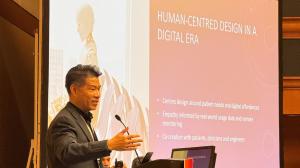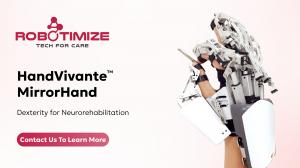Zen Koh to Deliver Keynote at Medical Design-MD2025 Conference on AI-Driven Healthcare Innovation

Zen Koh, Founder, CEO, and Executive Director of MotusAcademy, and Strategic Advisor at Robotimize Group, will deliver a keynote address at the 6th International Conference on Medical Design (MD2025) in Taoyuan, Taiwan.

Zen Koh addresses human-centered design principles in rehabilitation technology at RehabWeek 2025, Chicago

HandVivante™: A next-generation hand exoskeleton delivering intelligent, adaptive therapy to restore dexterity, strength, and fine motor function across all stages of recovery.
Zen Koh keynotes at Medical Design-MD2025, addressing AI integration, data ethics, and human-centered design in intelligent rehabilitation technology.
MD2025, jointly organized by the Medical Design Association (Taiwan), Smart Medical City, and Chang Gung University, convenes scholars, clinicians, engineers, designers, industry leaders, and policymakers to examine how emerging technologies reshape healthcare systems globally. The conference's interdisciplinary platform addresses urgent questions: How can AI enhance clinical decision-making without compromising the human elements of care? What design principles ensure that automation serves diverse patient populations equitably? How do rehabilitation technologies balance technical sophistication with practical accessibility?
These questions resonate deeply with Robotimize's development philosophy. The company's VivantePlexus™ platform and ACE™ partnership network represent ongoing efforts to harmonize intelligent systems with clinical workflows, technical capability with intuitive interfaces, and innovation ambition with implementation reality.
Taiwan's Role in Emerging Health-Tech Innovation
Taoyuan's selection as host city reflects Taiwan's strategic positioning within Asia-Pacific healthcare innovation. The region's concentration of research institutions, medical device manufacturers, and technology firms creates fertile ground for cross-sector collaboration—precisely the ecosystem thinking that characterizes effective rehabilitation technology deployment.
Smart Medical City, co-organizing MD2025, exemplifies Taiwan's commitment to integrating healthcare delivery with advanced technology infrastructure. This environment provides ideal context for discussing how rehabilitation robotics, AI-enabled therapy personalization, and data-driven outcome measurement can transition from research concepts to scalable clinical solutions.
The conference's five thematic pillars—AI and automation in smart healthcare, data-driven innovation and ethical challenges, telehealth integration, human factors and experience-driven design, and generative AI for health innovation—mirror the technological and ethical considerations Robotimize navigates daily.
"Taiwan's health-tech ecosystem demonstrates how regional innovation hubs accelerate technology adoption by fostering dialogue between developers, clinicians, and policymakers. MD2025 provides valuable opportunity to share insights on building rehabilitation systems that respect both technological possibility and clinical practicality," said Zen Koh, Strategic Advisor, Robotimize Group.
Human-Centered Design in an Age of Automation
The tension between automation and human-centered care forms a central theme in contemporary rehabilitation technology discourse. AI algorithms can analyze movement patterns, predict fall risks, and adjust therapy parameters—but these capabilities only deliver value when integrated thoughtfully into care relationships between patients, families, and clinical teams.
Robotimize's approach to this challenge involves designing systems where automation enhances rather than replaces clinical judgment. VivantePlexus™ technologies generate objective performance data that informs—not dictates—therapeutic decisions. Clinicians retain authority over treatment plans while gaining access to quantitative insights that manual observation cannot easily capture: subtle gait asymmetries, grip strength trends over weeks, cognitive task performance patterns.
This philosophy extends to patient interaction design. Rehabilitation technologies that appear intimidating or overly complex discourage engagement, particularly among elderly populations or individuals with cognitive impairments. Effective systems must balance technical capability with approachable interfaces—engineering challenges that require collaboration between roboticists, industrial designers, occupational therapists, and patients themselves.
MD2025's emphasis on "experience-driven design" acknowledges that medical technologies succeed or fail based not solely on clinical efficacy but on whether patients, families, and care teams actually use them consistently and correctly. This user-centered perspective increasingly shapes how Robotimize evaluates both internal development projects and potential ACE™ partnership technologies.
HandVivante™ MirrorHand: Precision Engineering Meets Patient-Centered Design
The challenges MD2025 explores—balancing technical capability with human-centered care—manifest concretely in Robotimize's HandVivante™ MirrorHand robotic hand rehabilitation system. Hand rehabilitation presents complex design problems: extraordinary anatomical variation across patients, diverse conditions from stroke to orthopedic injuries, and the need for meaningful progress to maintain engagement.
HandVivante™ MirrorHand addresses these through thoughtful engineering that prioritizes patient experience. Its lightweight design and biocompatible materials ensure comfort during prolonged therapy sessions, while motion-sensing technology enables natural, intuitive hand movement rather than forcing patients to adapt to rigid mechanical constraints.
The "MirrorHand" concept reflects evidence-based design thinking. Mirror therapy research demonstrates that visual feedback of symmetrical movement enhances motor recovery by engaging neuroplastic mechanisms. HandVivante™ integrates this approach within robotic assistance, creating multisensory rehabilitation experiences that address both physical capacity and neurological reorganization.
Development involved extensive clinical partnership—observing workflows, understanding constraints, and iterating based on frontline feedback. This participatory design process, where end-users shape technology rather than merely receiving finished products, exemplifies the collaborative innovation MD2025 promotes.
"Hand rehabilitation demonstrates why human-centered design isn't optional but fundamental. Every patient's hand anatomy differs, every condition presents unique challenges, and every individual brings different goals to therapy. Technology that ignores this variability—no matter how technically impressive—fails clinically," said Even Koh, Group General Manager, Robotimize Group.
Ethical Dimensions of Data-Driven Rehabilitation
The conference's focus on data privacy, algorithmic bias, and regulatory governance addresses critical concerns for any company deploying AI-enabled healthcare technologies. Rehabilitation robotics generate substantial patient data: movement kinematics, therapy session duration and intensity, performance trends, physiological responses to exercise protocols.
This data offers tremendous clinical value—enabling personalized therapy adjustments, predicting rehabilitation trajectories, identifying patients at risk of declining engagement. However, it also raises important questions: Who owns this data? How should systems handle sensitive information about functional limitations or cognitive impairments? What safeguards prevent algorithmic recommendations from perpetuating existing healthcare disparities?
Robotimize's data governance practices reflect awareness that patient trust depends on transparent, responsible information stewardship. The company's systems employ privacy-preserving architectures, provide patients with data access and control, and undergo regular security assessments. These aren't merely compliance exercises—they're foundational requirements for ethical rehabilitation technology deployment.
"Data ethics in rehabilitation extends beyond technical security measures to fundamental questions about patient autonomy and dignity. When we design systems that track intimate details of how people move, think, and recover, we accept profound responsibility to handle that information with care and respect," said Kerry Guo, Founder and CEO, Robotimize Group.
VivantePlexus™: Integrated Intelligence Meets Clinical Practicality
MD2025's exploration of AI and automation in smart healthcare reflects precisely the design challenges Robotimize confronts through VivantePlexus™—its integrated rehabilitation ecosystem connecting modular, interoperable technologies across the continuum of care. The platform addresses a fundamental problem: rehabilitation often fragments across disconnected devices and protocols, making it difficult for clinicians to track comprehensive progress or personalize therapy pathways effectively.
VivantePlexus™ technologies—including HandVivante™ for upper limb rehabilitation, GaitVivante™ ProMax for advanced gait training, RevitaVivante™ for FES cycling, and complementary systems spanning balance, cognitive stimulation, and telerehabilitation—share unified data architecture. This integration enables clinicians to understand how improvements in one therapeutic domain influence outcomes in others, personalizing treatment based on objective performance data rather than isolated observations.
The platform generates substantial patient data: movement kinematics, therapy session metrics, performance trends, physiological responses. This creates both opportunity and responsibility—the data offers clinical insights that improve care quality, but handling information about functional limitations and recovery trajectories demands rigorous privacy safeguards and transparent governance.
"Building rehabilitation systems that work together requires more than technical interoperability—it demands shared design philosophy where each technology contributes to comprehensive understanding of patient progress. VivantePlexus™ reflects our conviction that integrated data, when handled responsibly, empowers clinicians to make better decisions and patients to see meaningful connections across their recovery journey," said Professor Denny Oetomo, Co-Founder and CTO, Robotimize Group.
This integrated approach aligns with MD2025's emphasis on data-driven innovation balanced against ethical responsibilities—recognizing that intelligent systems only serve patients well when built on foundations of clinical validity, privacy protection, and human-centered values.
Cross-Sector Collaboration as Innovation Catalyst
MD2025's interdisciplinary composition—bringing together medical professionals, engineers, designers, industry representatives, and policymakers—reflects growing recognition that healthcare innovation requires diverse expertise. Rehabilitation technology development particularly benefits from this cross-pollination.
Engineers contribute technical knowledge about robotics, sensors, and control systems. Clinicians provide essential insights about patient needs, workflow constraints, and outcome priorities. Industrial designers ensure equipment appears approachable and functions intuitively. Regulatory experts navigate compliance pathways. Health economists assess reimbursement viability. Patients and families offer perspectives on lived experience with disability and recovery.
Robotimize's development process intentionally incorporates these varied voices. The company maintains advisory boards including practicing therapists, collaborates with academic researchers on clinical validation studies, engages with regulatory consultants early in product development, and seeks patient feedback on prototype designs. This collaborative approach slows development timelines but produces technologies more likely to succeed in real-world clinical environments.
The ACE™ partnership model extends this collaborative philosophy to technology sourcing. Rather than developing every capability internally, Robotimize identifies specialized developers whose innovations complement the VivantePlexus™ ecosystem. These partnerships work best when built on shared values: evidence-based design, patient-centered priorities, transparent communication, and willingness to adapt based on clinical feedback.
"Conferences like MD2025 accelerate innovation by creating spaces where different disciplines speak honestly about challenges, not just successes. We learn as much from understanding what doesn't work—and why—as from celebrating breakthroughs. These candid exchanges ultimately serve patients by helping developers avoid predictable mistakes and build on collective wisdom," said Even Koh, Group General Manager, Robotimize Group.
ACE™ Partnerships: Curated Ecosystems for Comprehensive Care
MD2025's emphasis on interdisciplinary collaboration finds direct expression in Robotimize's ACE™ (Alliance for Collaborative Excellence) partnership model. The rehabilitation technology landscape encompasses extraordinary diversity—robotic exoskeletons, functional electrical stimulation, virtual reality environments, haptic feedback systems, traction therapies, thermal medicine—each representing specialized expertise and distinct clinical applications.
No single company can develop best-in-class solutions across this spectrum. ACE™ creates curated partnerships with specialized developers whose technologies complement VivantePlexus™ capabilities, enabling comprehensive rehabilitation solutions while respecting the deep expertise each modality requires.
The partnership portfolio demonstrates this diversity: RoboCT's gait training exoskeletons, WEART's haptic sensor gloves, TTMT's immersive VR environments, MINATO Medical Science's recovery systems, and Von Ardenne Institute's hyperthermia technology. Each partnership begins with rigorous evaluation of clinical effectiveness, safety profiles, and alignment with patient-centered care principles.
"ACE™ represents our belief that comprehensive patient care requires diverse therapeutic approaches working together. By building partnerships grounded in shared values and evidence standards, we create ecosystems where complementary technologies serve patients better than any single solution could alone," said Kerry Guo, Founder and CEO, Robotimize Group.
Looking Forward: Rehabilitation Technology in Aging Societies
The conference context—Taiwan and broader Asia-Pacific region confronting rapid population aging—underscores urgent rehabilitation technology needs. Aging societies face mounting pressures: growing numbers of stroke survivors requiring intensive therapy, increasing prevalence of degenerative conditions affecting mobility and cognition, shrinking ratios of working-age therapists to elderly patients needing services.
Technology alone cannot solve these demographic challenges, but thoughtfully designed rehabilitation systems can help: multiplying therapist productivity by automating routine aspects of therapy delivery, enabling lower-skilled caregivers to deliver effective interventions under remote supervision, providing home-based solutions that extend clinical capacity beyond facility walls, generating outcome data that guides resource allocation toward most effective interventions.
These regional insights inform how Robotimize adapts technologies for diverse markets. Solutions effective in high-resource urban hospitals may require modification for rural clinics with limited technical support. Therapy protocols appropriate for stroke patients may need adjustment for individuals with progressive neurological conditions. Cultural attitudes toward technology, family caregiving roles, and healthcare expectations vary across regions, demanding localized implementation strategies.
Building Evidence While Scaling Innovation
The intersection of Zen Koh's strategic advisory role with Robotimize and his keynote invitation reflects MD2025's recognition that industry leaders must contribute to broader academic and clinical discourse. Companies developing rehabilitation technologies bear responsibility not only to their customers and shareholders but to the field as a whole.
This responsibility manifests through several commitments: publishing validation studies in peer-reviewed journals, sharing implementation experiences—including challenges and failures, participating in standards development for emerging technology categories, contributing to evidence-based practice guidelines, and supporting research infrastructure that benefits all stakeholders.
Zen Koh's recent appointment as Managing Editor of the Journal of Rehabilitation Methods & Technologies (JRMT) alongside Professor Denny Oetomo demonstrates Robotimize's investment in rehabilitation research ecosystem. These editorial roles position company leaders to ensure that industry perspectives inform academic publishing while maintaining the independence and rigor essential to credible science.
MD2025 provides complementary platform for knowledge exchange—more immediate and interactive than journal publication, enabling real-time dialogue about emerging challenges, contested questions, and practical implementation concerns that peer-reviewed literature sometimes overlooks.
About the International Conference on Medical Design (MD2025)
The International Conference on Medical Design (MD2025) is the 6th edition of a premier interdisciplinary platform established in 2018 by the Medical Design Association (Taiwan). Jointly organized with Smart Medical City and Chang Gung University, MD2025 convenes scholars, clinicians, engineers, designers, industry leaders, and policymakers to explore the intersection of design, technology, and healthcare. This year's theme, "Next-Gen Digital Health: AI, Automation, and Human-Centered Innovation," examines how emerging technologies can transform healthcare systems while maintaining focus on human needs and values. The conference takes place in Taoyuan, Taiwan, a rising hub for health-tech innovation and cross-sector collaboration.
More information: https://www.mdassn.org/MD2025/
About Robotimize Group
Robotimize Group is a next-generation health technology company headquartered in Singapore, specialising in intelligent rehabilitation robotics and digital neurotechnologies. Through VivantePlexus™, its integrated rehabilitation ecosystem, and ACE™, its strategic partnerships portfolio, Robotimize delivers comprehensive solutions that support motor, cognitive, and neurological recovery across hospital, home, and community settings. With regional hubs in Malaysia and Europe and a growing international partner network, Robotimize is redefining rehabilitation delivery—making it more personal, adaptive, and accessible. For more information, visit: www.robotimize.tech
Jerry HONG
Robotimize Group
+60 11-1224 1674
email us here
Legal Disclaimer:
EIN Presswire provides this news content "as is" without warranty of any kind. We do not accept any responsibility or liability for the accuracy, content, images, videos, licenses, completeness, legality, or reliability of the information contained in this article. If you have any complaints or copyright issues related to this article, kindly contact the author above.


